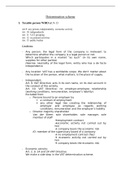Determination scheme
1. Taxable person WHO art.9-13
Art.9: any person, independently, economic activity
Art. 10: independently
Art. 11: VAT grouping
Art. 12: occasional activities
Art. 13: public bodies
Conditions:
- Any person: the legal form of the company is irrelevant to
determine whether the company is a legal person or not.
Which participates in a market “as such” (in its own name,
supplies for other parties)
Heerma: neutrality of the legal form, entity who has a de facto
independence
- Any location: VAT has a worldwide scope. We don’t matter about
the location of the person, what matters, is the place of supply.
- Independent:
Art. 9. VAT Directive: acts in its own name, on its own account in
the conduct of the activity.
Art. 10. VAT Directive: no employer-employee relationship
(working conditions, remuneration, employer’s liability)
Excluded from:
o Persons bound to an employer by
a contract of employment
any other legal ties creating the relationship of
employer and employee as regards working
conditions, remuneration and the employer’s liability
o Director-majority shareholder
Van der Steen: sole shareholder, sole manager, sole
member of staff
employment contract
economic activity not carried out by
him
company bears the economic risk
IO: member of the supervisory board of a company
no employment contract (fee)
economic activity not carried out by
him
company bears the economic risk
- Economic activity:
Art. 2, 9, 14 and 24 VAT Directive
We make a side-step in the VAT determination scheme.
,Rompelman: The start of an economic activities can be
considered as an economic activity as such if the intention to
carry out this business is present through an objective evaluation
INZO: end of economic activity
Fini H: when economic activity ends, right of deduction remains
provided that there is a link (direct and immediate) between the
payments made and the economic activity and in the absence of
any fraudulent or abusive intent has been established.
deemed self-supply 18(c), 74
o Supply for consideration (art.2,14,24)
Supplies of goods or services
For consideration
legal relationship
subjective value
direct link
Hong Kong: free of charge activities are not for
consideration
Commission v. Finland: direct link between the supply and
the payment. The receipt of a payment does not, per se,
mean that an activity is economic in nature. The
consideration must be received in return for the supply. If
this amount is not calculated solely on the basis of the
supplies received but also depends upon the recipient’s
income and assets: no direct link.
Gemeente Borsele: A transport service to school provided
by a municipality in which 66% are free of charge and 34%
in return of an amount of money comparable to 3% of the
costs really incurred is not an economic activity.
No economic activity because some supplies are for
consideration but overall not made for consideration (direct
link).
Lajver Melioracios: different order (1. Economic activity, 2.
Supply for consideration). For consideration even if modest
fees because that fee can be regarded as having a
‘continuing basis’ on account of the period of time during
which it is to be charged.
Kennemer Golf club: direct link between the service and the
annual fee paid by the members even if it is only the right
to access.
o Overall assessment/general aim to obtaining income on a
continuous basis
, number of customers, amounts/earnings involved,
nature of the goods/services: all the circumstances
on a market/active steps to market goods or services as
a trader.
SPÖ: no economic activity if advertising services for
development of informed political opinion because this
activity does not participate on a market. // Slaby and Kuc
and Fuchs
Enkler: exploitation of the property = economic activity if
period/customers/earnings
A loss company and non-profit organizations can be taxable persons.
Head office, branch, subsidiary and fixed establishment
A branch: dependent entity, if FE non-taxable transactions
A subsidiary: independent legal entity, if not FE taxable
transactions
DFDS and Dong Yang Electronics: a subsidiary can be a FE based
on economic situation and rational result for tax purposes.
Berkholz: a fixed establishment required
A sufficient degree of permanence
A structure adequate in terms of human and technical resources
Capable to supply or receives services or goods on an independent
basis
A FE can be receiving (art. 11(1) VAT R.), supplying (art. 11(2) VAT R.) or
intervening (art. 53)
FCE Bank (leading % Skandia): a fixed establishment is an extension of the head
office in another country. A fixed establishment, which is not a legal entity distinct
from the company of which it forms part, established in another Member State and to
which the company supplies services, should not be treated as a taxable person by
reason of the costs imputed to it in respect of those supplies. Therefore, for VAT
purposes, transactions between the head office and the branch are outside the scope.
Independence if bearing of economic risk and endowment capital.
Skandia (deviates from FCE bank principle): a main establishment in a third country
to its branch in a Member State constitute taxable transactions when the branch
belongs to a value added tax group. VAT group bank in Sweden and head office in
US. The Swedish branch is one person with the US head office. B2B supply (place of
the recipient: in Sweden; reverse charge mechanism; Skandia has to pay the VAT to





